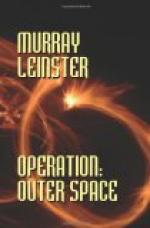The stewardess came up the ramp, moving briskly. She stopped and glanced at each passenger in each chair in turn. When Cochrane turned his open eyes upon her, she said soothingly:
“There’s no need to be disturbed. Everything is going perfectly.”
“I’m not disturbed,” said Cochrane. “I’m not even nervous. I’m perfectly all right.”
“But you should be drowsy!” she observed, concerned. “Most people are. If you nap you’ll feel better for it.”
She felt his pulse in a businesslike manner. It was normal.
“Take my nap for me,” said Cochrane, “or put it back in stock. I don’t want it. I’m perfectly all right.”
She considered him carefully. She was remarkably pretty. But her manner was strictly detached. She said:
“There’s a button. You can reach it if you need anything. You may call me by pushing it.”
He shrugged. He lay still as she went on to inspect the other passengers. There was nothing to do and nothing to see. Travellers were treated pretty much like parcels, these days. Travel, like television entertainment and most of the other facilities of human life, was designed for the seventy-to-ninety-per-cent of the human race whose likes and dislikes and predilections could be learned exactly by surveys. Anybody who didn’t like what everybody liked, or didn’t react like everybody reacted, was subject to annoyances. Cochrane resigned himself to them.
The red light-letters changed again, considerably later. This time they said: “Free flight, thirty seconds.”
They did not say “free fall,” which was the technical term for a rocket coasting upward or downward in space. But Cochrane braced himself, and his stomach-muscles were tense when the rockets stopped again and stayed off. The sensation of continuous fall began. An electronic speaker beside his chair began to speak. There were other such mechanisms beside each other passenger-chair, and the interior of the rocket filled with a soft murmur which was sardonically like choral recitation.
“The sensation of weightlessness you now experience,” said the voice soothingly, “is natural at this stage of your flight. The ship has attained its maximum intended speed and is still rising to meet the space platform. You may consider that we have left atmosphere and its limitations behind. Now we have spread sails of inertia and glide on a wind of pure momentum toward our destination. The feeling of weightlessness is perfectly normal. You will be greatly interested in the space platform. We will reach it in something over two hours of free flight. It is an artificial satellite, with an air-lock our ship will enter for refueling. You will be able to leave the ship and move about inside the Platform, to lunch if you choose, to buy souvenirs and mail them back and to view Earth from a height of four thousand miles through quartz-glass windows. Then, as now, you will feel no sensation of weight. You will be taken on a tour of the space platform if you wish. There are rest-rooms—.”




